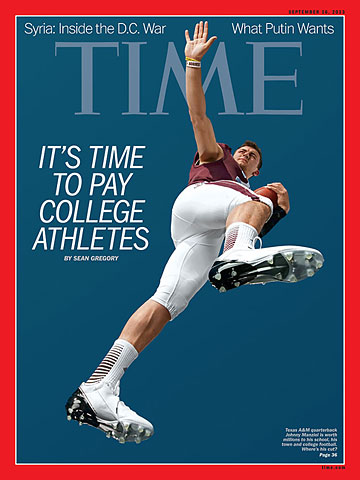
(4 of 7)
Aggie star Manziel was under fire for potentially seeking to recoup just a sliver of the economic value he helps create. The son of an oil-rich family who played his high school ball in Texas hill country, Manziel exceeded even Texas-size expectations when he nabbed the Heisman in his first year. NFL rules prohibit him from going to the pros, giving him no options to sell his skills. So he was forced to return to College Station and earn more money for the Aggies. Manziel can be as mischievous on the field, where his twitchy legs and laser arm make fools of opposing defenses, as he is off it; he's a party animal and makes no apologies for enjoying his life. The NCAA investigated Manziel because ESPN reported--inaccurately, says Texas A&M--that he signed his autograph for money, which is against the rules.
The real question is, What's the problem with that? "That's crazy to me that it's not allowed," says Minnesota Vikings running back Adrian Peterson, who starred at Oklahoma. "Actors, actresses--these people can sign things and get paid for it. How come this kid can't? How come a kid that's at a high level, that's going to be offered a big amount of money, can't sit down and be like, 'Damn, this is my decision.?'"
Manziel has not commented on any aspect of the NCAA charges. But his case has exposed some of the minor hypocrisies of not paying players at the big-league schools. The NCAA looked silly when Jay Bilas, a veteran ESPN analyst, former Duke basketball player and vocal critic of the NCAA, took to Twitter to point out that although schools cannot sell a player's jersey with his name on the back, if you typed Manziel into a search box on ShopNCAASports.com a No. 2 Texas A&M jersey pops up, available for up to $64.95. (Manziel wears No. 2.) Bilas' critique went viral; the NCAA temporarily shut down the site, saying it would no longer sell individual college and university merchandise there but only NCAA-branded stuff.
A court case may also shake up college sports. Four years ago, former UCLA basketball star Ed O'Bannon sued the NCAA, video-game maker EA Sports and a licensing company after realizing that his likeness was being used in a video game, while he saw none of the royalties, years after he graduated from college. NBA and NCAA legends Bill Russell and Oscar Robertson joined the suit, which reached the class-certification stage this summer. Though a federal judge in California hasn't stamped the case as a class action, she allowed the plaintiffs to add current players to the complaint, which significantly raises the potential damages for the NCAA. The plaintiffs are seeking a cut of the licensing revenue tied to video games, as well as a much richer revenue stream: the money schools receive from broadcast-rights contracts. If the former and current players somehow prevail--or even reach a settlement--college jocks will receive some kind of payday. "I think in this day and age, as opposed to yesteryear, the concept of what they consider amateur basketball is gone forever," says Robertson.
A Modest Proposal
